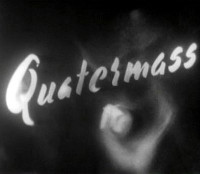 Quatermass – the 1950s granddaddy of British Science Fiction TV.
Quatermass – the 1950s granddaddy of British Science Fiction TV.
In our next podcast (number 55, due out any minute!) we discuss, amongst other things, the original Quatermass trilogy (as written by Nigel Kneale) and the film remakes it spawned. Given we won’t be giving too much background information I’ll take this opportunity to explain it a bit for those who aren’t all that familiar with it all.
Back in 1953 the BBC broadcast the first of three, 6 part, serials revolving around our protagonist Professor Bernard Quatermass. Quatermass was a throwback to, even then, earlier times when scientists were considered heroes. Attitudes were changing, scientists were beginning to be distrusted. Their thirst for knowledge and progress put all of us at peril – just look at the atomic bombings of Hiroshima and Nagasaki only 8 years earlier. This sets the stage for the first Quatermass adventure:
The Quatermass Experiment
Professor Quatermass and his small team of the British Experimental Rocket Group have succeeded in being the first to send a manned spacecraft into orbit. We join the action when all contact has been lost with the craft and its three crew. Quatermass and his ground team think all is lost. Eventually their radar does pick up the craft but its clearly veered far off course, having a much wider elliptical orbit than intended. There is no voice communication from the crew. Are they dead or it is just a malfunction?
After the space craft crashes into London the intact crew module is opened to find only one of the three crew. Where did the other two go? The door hadn’t been opened. Their empty spacesuits were still locked together, as if they hadn’t been taken off. The one survivor, Victor Carroon, is gravely ill and perhaps changing into something less than human…
Looking back at the Quatermass Experiment now it feels a bit like a 1950s B-Movie but, at the time, it was revolutionary, especially for television. Back in those days only a few million people had televisions sets in Britain and there was the only one channel to watch. Nonetheless The Quatermass Experiment has gone down in history as one of the first must-see serials, truly a piece of landmark television. According to Wikipedia, film historian Robert Simpson said that the serial had been “event television, emptying the streets and pubs for the six weeks of its duration.”
Most of the, very few, previous attempts to do Science Fiction TV on the BBC were squarely aimed at children. Quatermass certainly was not, as its (progressively getting later) timeslot suggested. Initially it was screened, on a Saturday evening, at 20:25, moving steadily later as the serial became more shocking, for the final part to start screen six weeks later at 21:00.
Quatermass II
Two years later, in 1955, a sequel series was produced. Professor Quatermass is still heading up the struggling British Experimental Rocket Group, now with plans to build a lunar colony. Events bring Quatermass face to face with an alien invasion via meteorite showers, contact with such a meteor turning people into the aliens’ unwilling slaves.
Very much Invasion of the Body Snatchers, before that film arrived the following year, this serial inspired (to say the least) the famous and renowned first Doctor Who story for the third Doctor, Jon Pertwee – namely Spearhead from Space. The concept of an alien intelligence slowly infiltrating the government has since been much used and in this 1955 early cold war environment it’s very easy to see where the idea might have originally come from.
Like the Quatermass Experiment, Quatermass II was performed live on the night of broadcast but as the budget had been essentially doubled they could pre-record even more film inserts. A lot of that pre-recorded material took advantage of the fact it didn’t have to be tied to a studio and were the most ambitious shots ever done in British television to that time.
Again Professor Quatermass’ adventures were a huge success with the (now burgeoning) British viewing public and would live on in the viewer psyche for decades to come. Apparently 90% of viewers questioned, soon after the serial concluded, had watched at least five episodes of the production. A viewing figure that little or nothing could hope for today.
Quatermass and the Pit
Perhaps the best remembered Quatermass story hit our screens at the end of 1958 and through to early 1959, in the form of Quatermass and the Pit.
Partly inspired by the Notting Hill race riots of 1958 this tale told of an ancient insectoid Martian race that millions of years ago had come to Earth and genetically manipulated humanity, giving us much of our darker aspects. This story also takes the previously SF-only series into the realm of the supernatural (although all ‘explained’ scientifically, of course) with telekinesis, telepathy and racial memories.
This was the final Quatermass the BBC television produced (not counting the 2005 live remake of the Quatermass Experiment, featuring Jason Flemyng as Quatermass and David Tennant as Dr. Briscoe). In the mid-60s there were plans for the BBC to make a fourth Quatermass serial but, after a difficult and prolonged gestation, it finally went to the rival ITV station in 1979. Simply called ‘Quatermass’ that serial, starring John Mills as a retired Bernard Quatermass, concluded the Professor’s adventures. As I have yet to see this particular story I shall leave talk of it until a later time!
Watching Quatermass Today
The original BBC serial of Quatermass and the Pit was, again like it’s two predecessors, performed largely live on the night of broadcast but with film inserts to cover scenes too complicated to perform live or requiring location work.  Fortunately by Quatermass II the BBC had realised what they had on their hands and telerecorded the live transmission (basically pointing a film camera at the TV monitor as it was performed!) For that reason Quatermass II and Quatermass and the Pit still exist in the BBC archives and are available on DVD. They began to telerecord the original The Quatermass Experiment (a very unusual undertaking in 1953) but stopped after the second episode as they didn’t think the results were of high enough technical quality to be resold abroad (not helped by an insect flying about the monitor (and therefore being inadvertently filmed) in episode two). Those two episodes are available on the BBC’s ‘Quatermass: Complete Collection’ DVD boxset, which contains all the 1950s TV serials and various documentaries.
Besides the original BBC serials there were also corresponding big screen film adaptation made of each of the three by Hammer Film Productions. Named The Quatermass Xperiment (or, in the US, The Creeping Unknown), Quatermass 2 (US title: Enemy From Space) and Quatermass and the Pit (finally both the same name in the US and the same name as the original serial!) The first two featured, the somewhat controversial choice of, the American actor Brian Donlevy as Professor Quatermass. Donlevy being the only man, on screen, to play Quatermass in more than one story. Quatermass and the Pit starred, the much better accepted (and British! (specifically Scottish)), actor Andrew Keir as Quatermass. Keir is the only other man to have played Quatermass twice, though the second time on radio rather than screen in the BBC’s 1996 The Quatermass Memoirs.
As we say in the podcast, if you are a fan of Doctor Who (or, really, British Sci-Fi in general) then you owe it to yourself to seek out Quatermass. Its impact on British Science Fiction TV cannot be underestimated. I would recommend the BBC serials over the Hammer films, at least initially (though I personally think Hammer’s Andrew Kier might be the finest Quatermass) as that way you’ll see them exactly as the original 1950s TV audience did – groundbreaking television. I would warn you though, this is very early television we are talking about, over 50 years old, so don’t go in expecting modern acting, pacing or visual effects! Close the curtains, turn out the lights and try to imagine you’ve never seen its like before!








 Last night I found myself stuck in a
Last night I found myself stuck in a  Quatermass – the 1950s granddaddy of British Science Fiction TV.
Quatermass – the 1950s granddaddy of British Science Fiction TV. The Time & Again DWAS convention will only be allowing people from the one particular podcast to record any conversations with the guests. Clearly they are well within their rights to do so but it has ruffled a few feathers, to say the least.
The Time & Again DWAS convention will only be allowing people from the one particular podcast to record any conversations with the guests. Clearly they are well within their rights to do so but it has ruffled a few feathers, to say the least.
Recent Comments